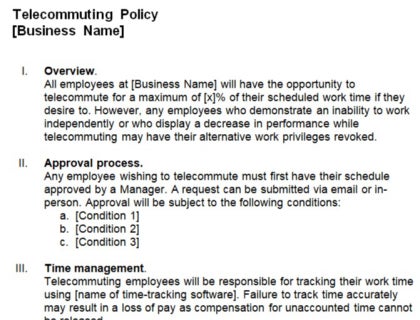
Telecommuting Policy Template:
Create your own telecommuting policy in minutes using this free Microsoft Word template.
Download NowTelecommuting Policy Sample:
Telecommuting Policy
[Business Name]
1. Overview.
All employees at [Business Name] will have the opportunity to telecommute for a maximum of [x]% of their scheduled work time if they desire to. However, any employees who demonstrate an inability to work independently or who display a decrease in performance while telecommuting may have their alternative work privileges revoked.
2. Approval process.
Any employee wishing to telecommute must first have their schedule approved by a Manager. A request can be submitted via email or in-person. Approval will be subject to the following conditions:
a. [Condition 1]
b. [Condition 2]
c. [Condition 3]
3. Time management.
Telecommuting employees will be responsible for tracking their work time using [name of time-tracking software]. Failure to track time accurately may result in a loss of pay as compensation for unaccounted time cannot be released.
4. Informal telecommuting.
All employees have automatic approval to telecommute during the course of business travel. As this is a temporary and informal telecommuting arrangement, it does not constitute ongoing approval to telecommute.
5. Overtime.
The use of overtime hours while telecommuting is not permitted. Any employees who log overtime hours while telecommuting may be subject to immediate termination.
6. Miscellaneous.
[Add any other conditions, rules, or exceptions that apply to your telecommuting policy.]
How to Write a Telecommuting Policy:

A good telecommuting policy should include a set of rules that govern the working conditions of employees outside of the office. It should clearly state who is eligible for telecommuting and the boundaries of their remote work, and provide a clear and thorough outline of rules and penalties.
Lay the groundwork.
Specify the scope of your policy.

Some companies allow for 100% telecommuting, while others limit telecommuting options to just a fraction of employees' work schedules. Your policy should begin with a clear explanation of how much telecommuting will be permitted and who is eligible.
Explain the approval process.

Employees who are willing and eager to telecommute will want to know how they can be approved to do so. Whether it's by submitting a form, speaking to a manager, or sending an email, clearly state how employees can submit their requests to telecommute.
Be specific and communicate clearly.
Present telecommuting rules.

A good structure will help to ensure that your employees don't become complacent while they are working from home. Having clearly stated rules, like how time will be tracked, what hours must be worked, etc., will help to keep your employees on track.
Address possible disciplinary actions.

Your telecommuting policy should discourage employees from taking advantage of their new-found freedom. Outline possible disciplinary actions that will be taken if an employee violates the rules of your policy. Disciplinary actions may include revoking telecommuting privileges, suspension, and even termination in severe cases.
Similar Policies:
- Bereavement Leave Policy.
- Cell Phone Policy.
- Company Credit Card Policy.
- Company Travel Policy.
- Company Vehicle Policy.
- Conflict of Interest Policy.
- Cyber Security Policy.
- Dress Code Policy.
- Paid Time Off Policy.
- Social Media Policy.
- Overtime Policy.
- Attendance Policy.
- Expense Reimbursement Policy.
- Sexual Harassment Policy.
- Remote Work Policy.
How to Transition Employees to Working From Home


